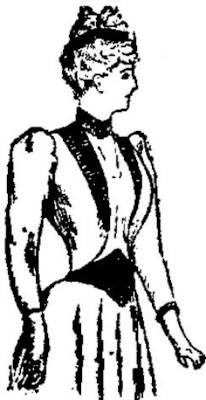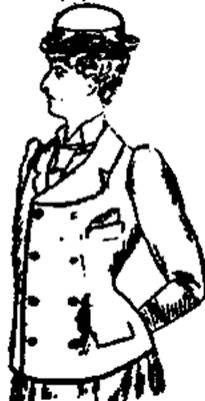This article has been transcribed from a copy of the Cardiff Times in the online collection of scanned Welsh newspapers 1804-1919 in the National Library of Wales, with grateful recognition of the free access accorded to all readers. Paragraph breaks have been introduced for easier reading.
Explanatory notes
'Ladies gamble to no small extent, and it is not only in gloves that they do so': it was a convention that ladies should limit their stakes in card games to their white kid gloves, or the cost thereof. This was probably more honoured in the breach than the observance. See the captions to the third and fourth illustrations. The woman in the fourth is wearing less 'feminine' clothes than the woman in the third, as an indication that she is not a perfect lady.
'The recent Baccarat exposure': in February 1891 (the month before this column was published), Sir William Gordon-Cumming, a lieutenant colonel in the Scots Guards, brought an action for slander against the hosts of a party at which he had been accused of cheating, on the grounds that they had revealed the accusation to the press. The Prince of Wales (later Edward VIII) was called as a witness. Gordon-Cumming lost the case, was dismissed from the army and ostracised by Society. The sympathy of the public who were not in the upper crust was largely in Gordon-Cummings’s favour, and numerous novels and plays were written about the case.
Samuel confuses 'peers' meaning members of the nobility with the phrase 'his peers', as used in Magna Carta, where trial by one's peer means trial by one's social equals. Here that would be poor man‘s social equals, or commoners, a sense undreamt of in 1215, since when the phrase has been misapplied to great and beneficial effect. —— David Skilton

here has of late been much talk about gambling, and especially such gambling as goes on in 'high life.' Some people have suggested that an Act of Parliament should be passed for the purpose of putting down gambling in private houses, while others have read and written homilies on the sin and wickedness of playing cards, even for sixpenny points, with a postscript to the effect that anyone who plays cards either for love or money is on the high road to eternal perdition. There can be no doubt that gambling in any form is at times productive of bad results, but as gambling goes on daily and will go on until the English race is exterminated, it is absurd to try and stop it by Act of Parliament. You might as well try to 'stop waves with a pitchfork.'

Doesn't bet. Gambles in stocks and shares.
Gambling is part and parcel of an Englishman's nature, and most specimens of the race will bet upon anything in this world and would not mind a mild speculation on something in the next, if they thought there was any possibility of their being able to decide the wager.
Even the boys at school bet, and as they grow up their gambling transactions increase in accordance with the state of their incomes.

Would gamble if he dare.
Ladies gamble to no small extent, and it is not only in gloves that they do so. A well-known writer once said that all women were gamblers at heart, and he was not far out in his assertion. When women commence to gamble they put their whole hearts into their speculation, and the excitement consequent upon all extensive gamble [sic] becomes as necessary to their existence as does their sal volatile or pearl powder.
With many women the necessity is not entirely consequent upon excitement, but may arise from more tangible causes — principally commercial and in the interest of an obdurate creditor.

Gambles for gloves.
The recent Baccarat exposure has shown that maiden modesty in reference to gambling is a thing of the past, and it is now considered as much part of a hostess's duty to gamble as to see that her guests are comfortable.
Our ancestors, heavy gamblers as they were, would have been horrified had anyone suggested that their womankind should join them at the dice-box or at the card-table, but to-day in 'high places' the woman who does not gamble is the exception and not the rule.
It is a sad reflection on our boasted civilization that this should be so, but the fact remains that it is. Education has not yet reached that pitch of perfection when its influence will show men and women that gambling is a fatal amusement likely to lead to ruin, and not unfrequently to death of most objectionable kind.
The records of Monte Carlo tell many a tale of life cut short in the prime after a run of bad luck at the fascinating but fatal tables.
Yet, year after year. men and women go to Monte Carle for no other purpose than to gamble.
Only fancy a man or a woman having but one object in life, and that gambling.
And all the outcome of an inadequate salary.

Gambling for cash.
Who does not know the feverish excitement, the flashing eye, and the sallow face of the regular gambler? Who has not watched with what a gloating air of triumph he picks up his gains and with what a load: of regret he sees Fate going against him? It is a sorry sight, yet all the power of persuasion in the world would not move him from his intentions [sic], which is to break the bank or ruin himself.
Foolish fellow. If the moth hovers round the candle long enough it is certain to singe its wings, and the gambler who sticks to his business with sufficient persistency is certain to come out of the fray a ruined man. In commerce the spirit of gambling has become implanted in the soil, and men are daily trying to make fortunes by means of gambling speculations.
What is the Stock Exchange but a gambling mart, where men gamble openly and by permission of the law. The spirit of gambling is innate, and most men and women possess it, and only requires opportunity to develop[e] it.
Legislation will not put gambling down either on the racecourse or in the private room, and the sooner this fact is understood the better. Police-court prosecutions for betting are a farce – for the poor man is fined for backing a horse for a limited sum, while [his] peers are allowed to do the same thing for thousands without any interference on the part of the authorities; which is one of the anomalies of English law. The coalheaver bets 'a pint' when he wants to settle an argument, and the peer bets a 'cool thousand' when he thinks he has got a 'cheap thing' on, yet one is considered a pernicious habit while the other is looked upon as the correct thing by society.
And so gambling goes on and will go on in spite of remonstrance or legislation.
Links to Related Material
Last modified 24 April 2022